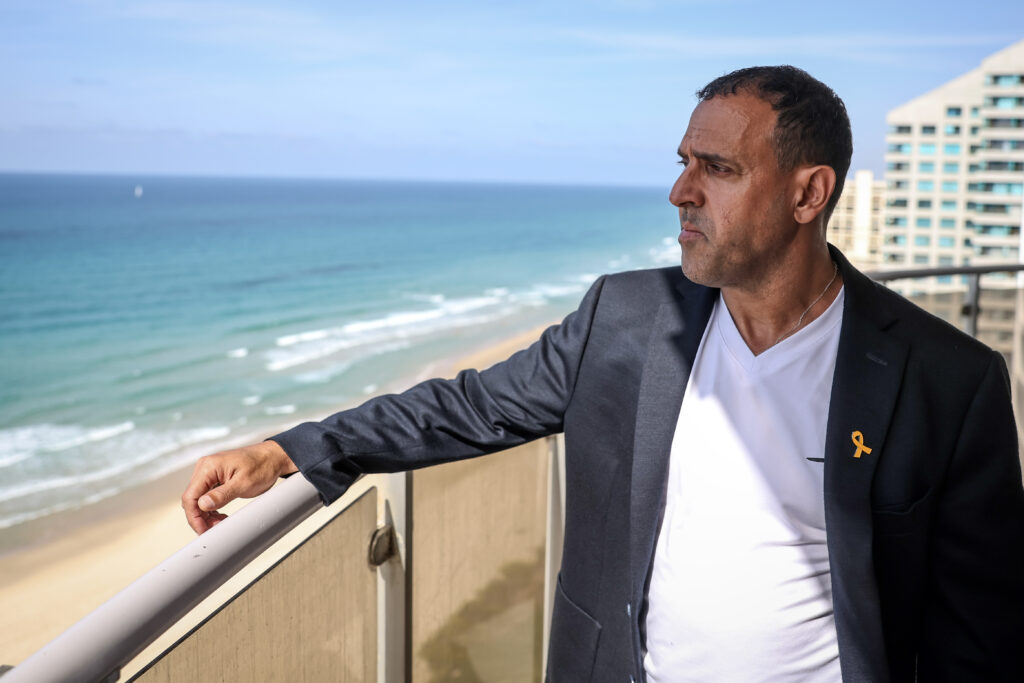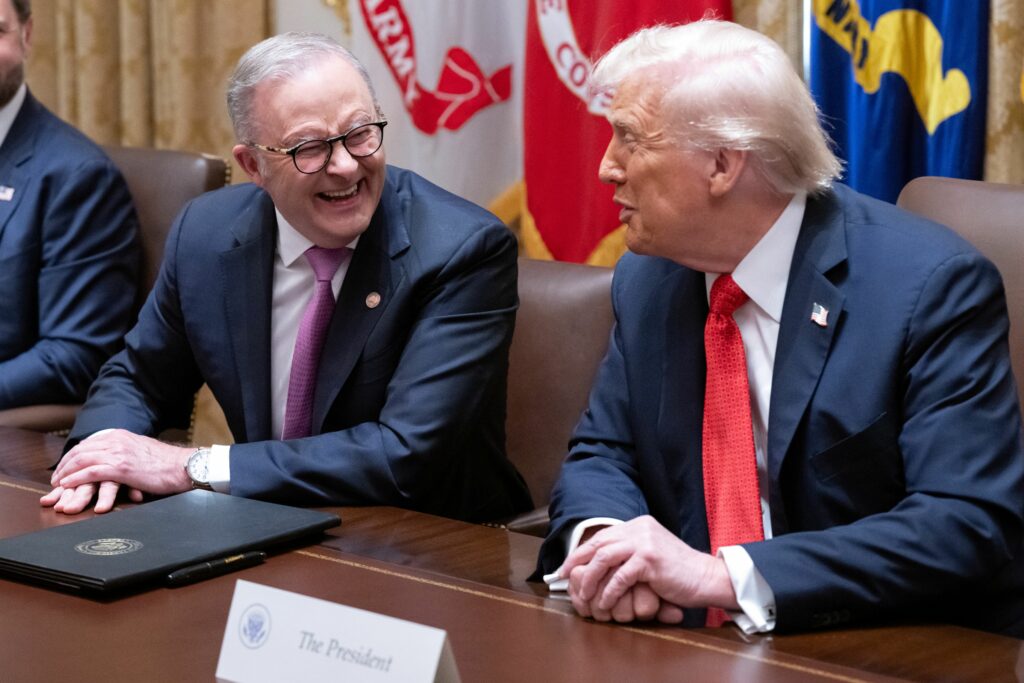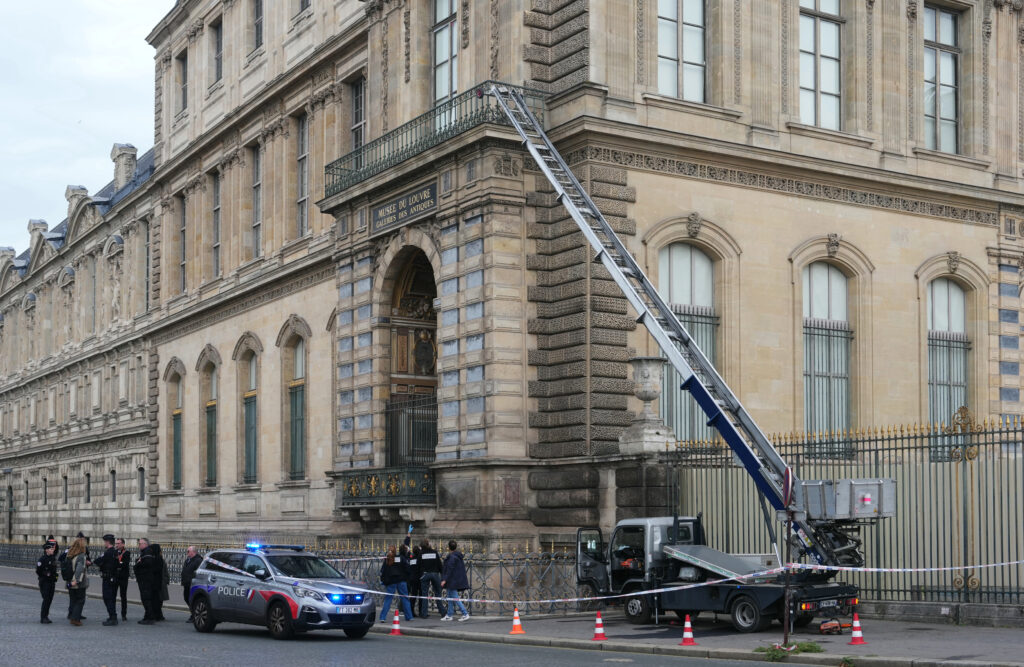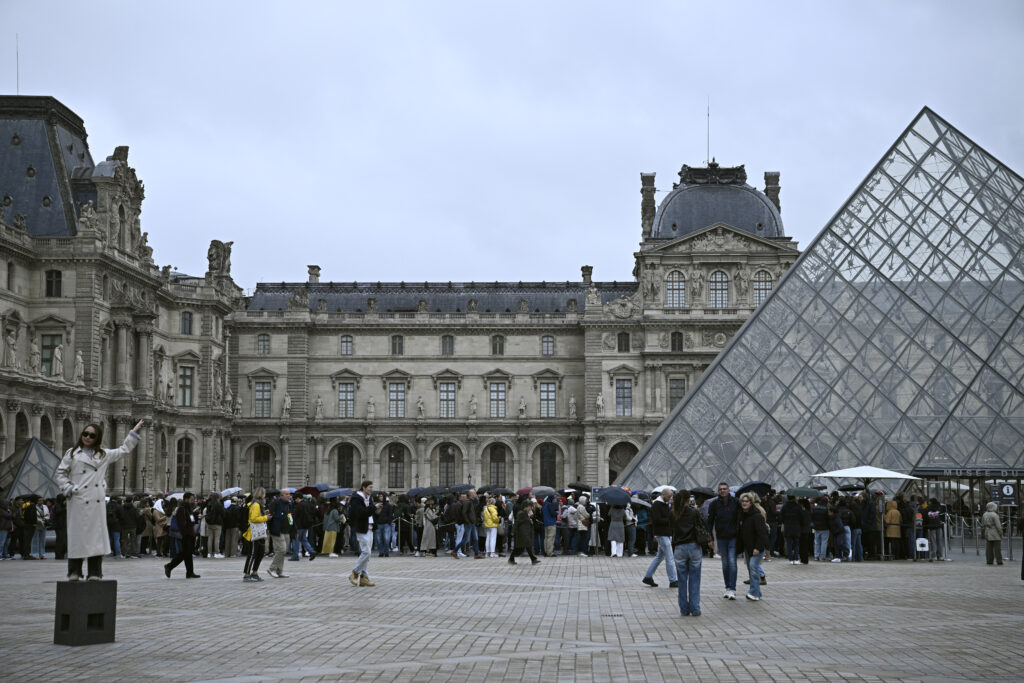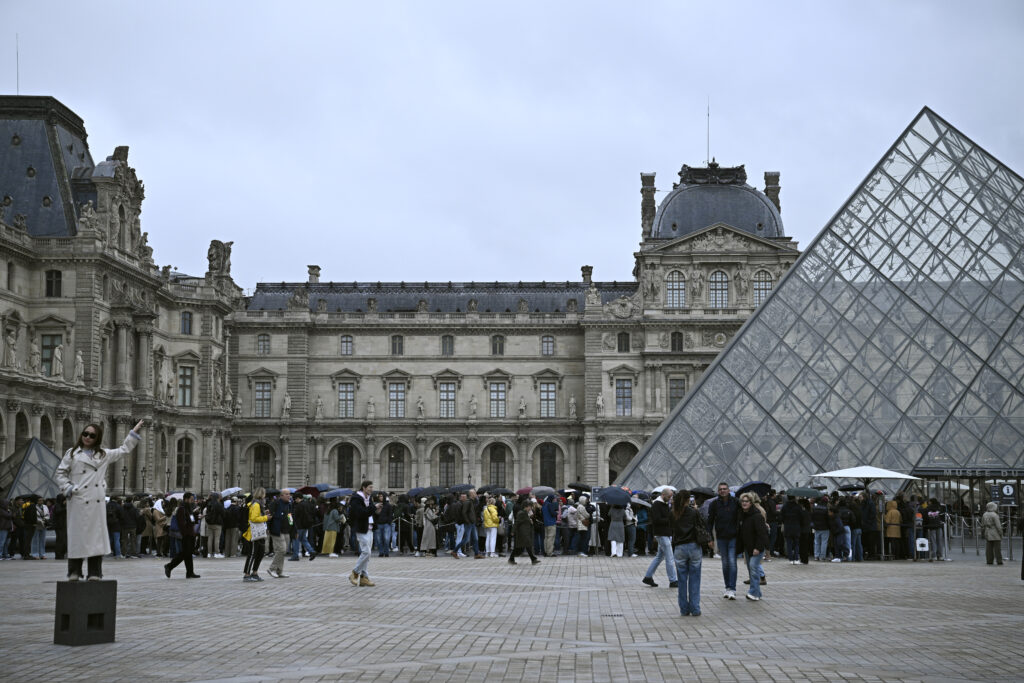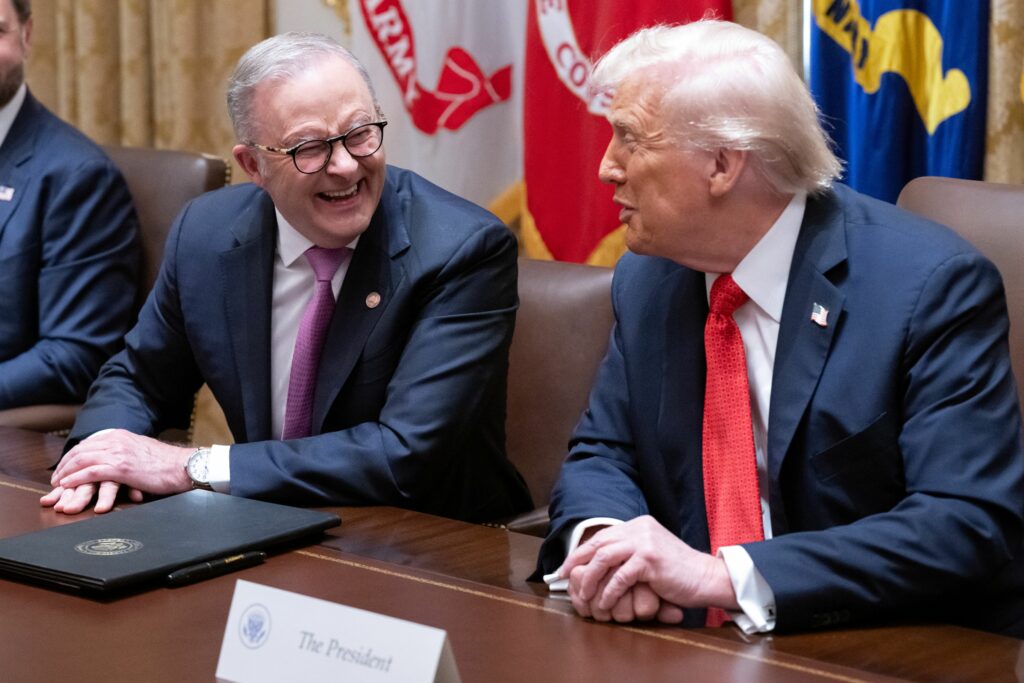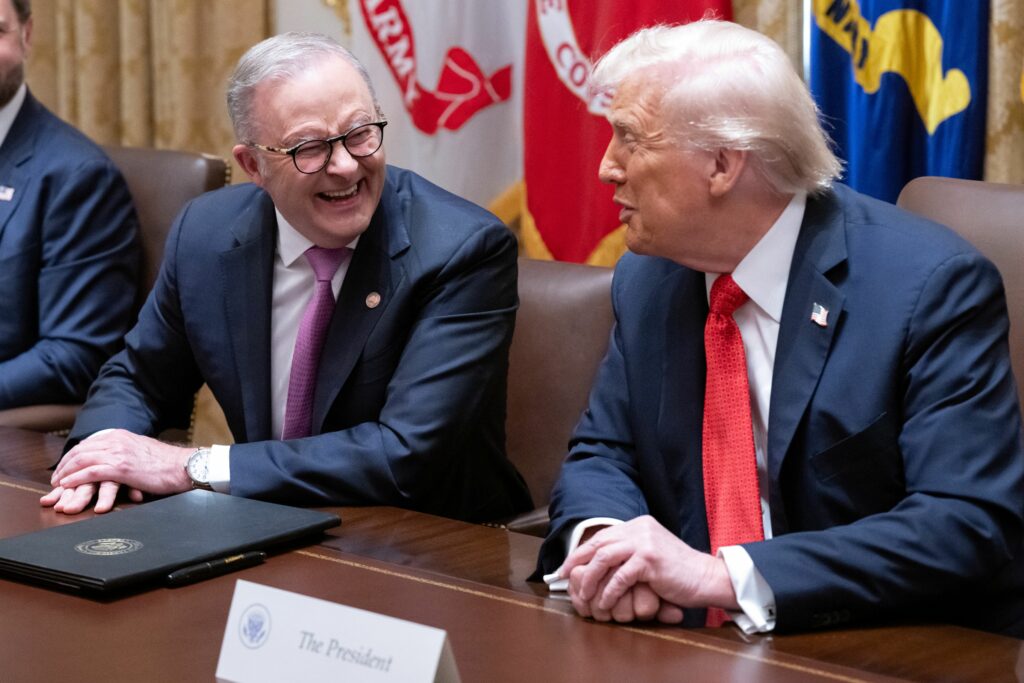Former Israeli hostage ‘looking ahead’, determined to move on
After more than a year trapped in a dark tunnel under Gaza, Eli Sharabi is determined to move forward with his life, even as he knows that pain and grief will be constant companions.”It’s impossible to forget even a single moment of my captivity,” the 53-year-old Israeli former hostage told AFP in an interview on Monday.”But it does not define who I am.”Sharabi was abducted from his home in Kibbutz Beeri during the unprecedented Hamas attack on southern Israel on October 7, 2023. That day, he lost almost everything.Hamas gunmen killed his wife and two daughters and also seized his brother, Yossi Sharabi, dragging him to Gaza as well.While in captivity, Eli Sharabi learned of his brother’s death, but he remained unaware that the attackers had killed his wife and daughters until he was freed during a ceasefire earlier this year that ultimately collapsed.Yossi Sharabi’s remains were returned to Israel just days ago under a new truce brokered by US President Donald Trump.”The extended Sharabi family has been waiting for this for two years,” Sharabi said calmly.”We needed closure. It’s important to us. But it’s clearly a very sad ending.”Sharabi, dressed in jeans, a white T-shirt and a black blazer, wore a yellow ribbon pinned to his lapel, a symbol of solidarity with those still held in Gaza.Under the current ceasefire, all 20 surviving hostages have been released, and the remains of 12 hostages have been returned. The bodies of over a dozen more remain in Gaza.The deaths of his wife and daughters left him shattered but also strengthened him, he said.”The sadness and the loss of my wife, my daughters and my brother will stay with me until my last day,” Sharabi said.”But I’m a person who is always optimistic, always looking for solutions, always looking ahead.”- ‘I love life’ -While in captivity, Sharabi lost 30 kilograms and endured extreme conditions: hunger, darkness, deprivation and a lack of basic hygiene.Yet he remembers most of his conversations with fellow hostages and their small efforts to keep each other’s spirits alive.Among them was Alon Ohel, with whom he shared 14 months in a tunnel beneath Gaza.”We helped each other stay human,” Sharabi said, adding that he refused to let anger dominate him.”I love life,” he said.”The loss, the sadness and the anger will run alongside my life… but they won’t control it.”Soon after his release, Sharabi wrote a memoir, “Hostage”, in which he recounts his last moments before being dragged from his home.Turning to his daughters, Noya, 16, and Yahel, 13, he said: “I will come back. I promise.”That vow sustained him through captivity.Six weeks after his release, Sharabi addressed the United Nations Security Council, delivering an impassioned speech.”I stand before you to testify — and to ask: Where was the United Nations? Where was the Red Cross? Where was the world?” he said at the time.He sees his book as a historical record. “This book had to be written,” he said. “It’s a historical document for future generations.””Hostage” has become an instant bestseller in Israel, selling over 100,000 copies.Editions are now available in Hebrew, English and French, and Sharabi hopes for more translations.He, however, has no plans to return to Kibbutz Beeri, the site of one of the deadliest massacres on October 7, where Israeli forces say hundreds of Hamas gunmen killed more than 100 civilians and took 32 hostages.When asked what he felt about his captors, he said: “It will take two generations to bring some sanity in them and they need a sane leadership.””Otherwise it’s the same.”Sharabi now dreams of a quieter life in the future.”I want an anonymous, ordinary life, to start the morning with a walk by the sea… to have a normal life with friends and family around me,” he said, a faint smile crossing his face.
Trump rassure Canberra sur ses sous-marins
Donald Trump a déclaré lundi au Premier ministre australien Anthony Albanese, en visite aux Etats-Unis, que son pays recevrait des sous-marins dans le cadre d’un accord conclu en 2021, et signé un accord sur les minerais critiques dans l’espoir de desserrer l’étau chinois sur ce marché.”Les sous-marins que nous commençons à construire pour l’Australie avancent vraiment bien”, a affirmé le président américain aux journalistes aux côtés de M. Albanese à la Maison Blanche, alors qu’il avait précédemment émis des doutes au sujet de cet accord signé sous l’ancien président Joe Biden.”Nous avons travaillé longtemps et dur sur ce projet, et nous entamons ce processus dès maintenant. Et cela avance vraiment très rapidement, très bien”, a-t-il ajouté.Canberra cherchait à se rassurer à propos d’un pacte de 2021 visant à armer l’Australie en sous-marins US Virginia, des engins d’attaque nucléaires furtifs. La livraison d’au moins trois unités était prévue sous 15 ans, avec en prime un transfert de technologie, dans le cadre de leur alliance Aukus (qui comprend aussi le Royaume-Uni).Mais Donald Trump avait demandé en juin de passer en revue cet accord de coopération militaire pour s’assurer qu’il soit aligné avec sa politique défendant “l’Amérique d’abord”.En 2021, l’affaire avait provoqué une grave crise diplomatique avec la France après que l’Australie eut annulé un contrat de plusieurs milliards de dollars pour l’achat d’une flotte de sous-marins à moteur diesel à Paris et opté pour le programme Aukus à la place.- Minerais -Les deux dirigeants ont, par ailleurs, paraphé un accord sur les minerais critiques dont l’Australie regorge.”L’Australie et les Etats-Unis verseront un milliard de dollars au cours des six prochains mois pour des projets immédiatement disponibles”, a assuré le Premier ministre australien.L’Australie est assise sur des gisements importants de lithium, de cobalt, de manganèse et même de terres rares, utilisées dans des produits cruciaux tels que les semi-conducteurs, les équipements militaires, les véhicules électriques et les éoliennes.Le marché est actuellement archi-dominé par la Chine, accusée de profiter de sa position pour mettre la pression sur ses partenaires commerciaux, ce qui inquiète les Etats-Unis.De son côté, Canberra craint l’influence grandissante de Pékin dans le Pacifique et cherche à se présenter devant Washington comme un allié de choix.M. Albanese a dévoilé en avril un plan de réserve stratégique de minerais essentiels destinée aux “partenaires clés” de l’Australie, tels que les Etats-Unis, pour contourner la Chine.Donald Trump a brandi en octobre la menace de droits de douane supplémentaires de 100% pour la Chine en réponse à ses réductions d’exportations de ces terres rares, même s’il a ensuite assoupli son discours et que les deux parties se sont accordées sur de nouvelles négociations commerciales.- Echange avec l’ambassadeur australien -Interrogé au sujet des relations avec Pékin, Donald Trump a dit lundi qu’il rencontrerait le président chinois Xi Jinping en marge du sommet de la Coopération économique Asie-Pacifique (APEC) en Corée du Sud à la fin du mois et qu’il se rendrait en Chine au début de l’année prochaine.”J’ai été invité en Chine, et j’irai sûrement en début d’année prochaine. C’est à peu près organisé”, a-t-il dit en louant sa relation privilégiée avec Xi malgré les différends. Il a dit que sa priorité était de conclure un accord commercial “équitable” avec la Chine.”Je veux être bon envers la Chine. J’apprécie beaucoup ma relation avec le président Xi. Nous avons une excellente relation”, a-t-il assuré.Seule fausse note, un échange à propos de l’ambassadeur d’Australie à Washington, Kevin Rudd, lorsqu’un journaliste a fait remarquer que l’ancien Premier ministre était dans la salle et a demandé au président américain s’il était gêné par ses commentaires.M. Rudd a supprimé une série de messages critiques à l’égard de Trump sur les réseaux sociaux après la victoire du républicain l’année dernière.”Je ne vous aime pas non plus. Pas du tout. Et probablement jamais”, a déclaré M. Trump sous le regard un peu médusé de M. Albanese.
Après le casse spectaculaire au Louvre, la sécurité des musées en question
Le vol de joyaux d’une valeur inestimable au musée du Louvre dimanche, précédé d’une série de cambriolages à Paris et ailleurs en France, interroge la sécurité des musées, défaillante, selon plusieurs sources interrogées par l’AFP.Un pré-rapport de la Cour des comptes pointe ainsi le “retard persistant” pris par le musée le plus visité au monde (neuf millions de visiteurs en 2024) dans le déploiement d’équipements destinés à assurer la protection de ses oeuvres.En janvier, la présidente du Louvre, Laurence Des Cars, avait alerté la ministre de la Culture, Rachida Dati, pointant un “niveau d’obsolescence inquiétant”, une “multiplication d’avaries” et la nécessité de grands travaux.”On sait très bien qu’il y a une grande vulnérabilité dans les musées français”, a reconnu le ministre de l’Intérieur, Laurent Nuñez, interrogé sur de possibles failles dans le dispositif de surveillance.Dimanche, peu après l’ouverture, des cambrioleurs se sont introduits dans la galerie d’Apollon du musée, qui abrite notamment les joyaux de la Couronne de France, brisant les fenêtres de la salle à l’aide d’une disqueuse après s’être hissés depuis l’extérieur sur une nacelle. Ils ont fracturé les vitrines et ont dérobé un ensemble de parures en pierres précieuses et diamants, en quelques minutes à peine.- Système inopérant -Un mois plus tôt, des voleurs s’étaient introduits durant la nuit au Muséum d’histoire naturelle à Paris en forçant une porte de secours à l’aide d’une disqueuse puis une vitrine blindée avec un chalumeau pour emporter 6 kg de pépites d’or. Le système d’alarme et de vidéosurveillance du Muséum était “inopérant” depuis une cyberattaque survenue le 25 juillet, a appris l’AFP de source policière, ce que le musée n’a ni confirmé, ni démenti.Début septembre, deux plateaux chinois et un vase classés “trésors nationaux” ont été dérobés en pleine nuit au musée national Adrien Dubouché de Limoges, qui possède une riche collection de porcelaine, un préjudice de plusieurs millions d’euros, opéré probablement à la demande d’un commanditaire, selon les autorités.Selon l’Office central de lutte contre le trafic des biens culturels (OCBC), si “la sécurité est inégale d’un musée à l’autre”, ils “sont de plus en plus ciblés au titre des valeurs et oeuvres très importantes qu’ils détiennent”.La Cour des comptes explique que des équipements ont été installés au cours des dernières années au Louvre dans les espaces d’expositions temporaires qui accueillent nombre de prêts venus de l’étranger, au détriment des salles qui abritent les collections permanentes.- Manque d’équipements et d’agents -Ainsi, “60% des salles de l’aile Sully et 75% pour l’aile Richelieu ne sont pas protégées” par vidéosurveillance, précise-t-elle.”Le 26 mai 2024 à 13H49 j’ai pu m’approcher d’un fragment de retable peint par Raphaël, une tête d’ange, jusqu’à le toucher, ce que je n’ai pas fait, sans qu’aucune alarme ne se déclenche ni qu’aucun agent ni conservateur ne m’interpelle”, raconte à l’AFP une spécialiste française de la Renaissance italienne sous couvert d’anonymat.Elle déplore “une protection des oeuvres défaillante contrairement à nombre de musées italiens”.Quand les équipements de vidéosurveillance existent, “ils sont en partie obsolètes”, déplore Christian Galani de la CGT Culture, en poste au musée.Selon ce représentant syndical, le Louvre “manque aussi d’agents de surveillance, avec 200 emplois supprimés en 15 ans alors que la fréquentation a été multipliée par 1,5. Vous pouvez traverser plusieurs espaces sans en croiser un seul et plusieurs salles sont systématiquement fermées faute d’agents disponibles”, ajoute-t-il.En cause, “des budgets insuffisants et peu transparents”, affirme-t-il. Selon lui, “environ 17 millions d’euros ont été programmés en 2025 pour la prévention des risques, l’électricité, les ascenseurs et la climatisation dont deux millions pour la sûreté”.Dans un communiqué lundi soir, la CGT Culture a réclamé notamment le “réengagement de l’État dans le financement de ses établissements” et le recrutement “massif” d’agents “dans la filière accueil, surveillance et magasinage”.De grands travaux de rénovation du Louvre ont été promis fin janvier par le président de la République Emmanuel Macron. Ils ont été évalués entre 700 et 800 millions d’euros sur une dizaine d’années, dont seulement une part minoritaire sera financée par l’État.Le musée compte notamment sur un billet d’entrée plus cher, fixé à environ 35 euros pour les visiteurs hors UE à partir de 2026, pour garantir un apport supplémentaire de recettes.
Vol de bijoux au Louvre: les voleurs traqués, le musée sous pression
L’enquête bat son plein: au lendemain du cambriolage du Louvre, au cœur de Paris, la police est aux trousses de quatre malfaiteurs partis avec huit “joyaux de la couronne de France”, un vol spectaculaire qui interroge sur la sécurité du plus célèbre musée du monde.Ce vol par effraction a déclenché une polémique politique et a relancé le débat sur la sécurité des musées français, dont le Louvre, resté fermé lundi.Le ministre de l’Intérieur, Laurent Nuñez, a prévu d’envoyer une instruction à tous les préfets pour qu’ils renforcent, si nécessaire, la sécurité des établissements culturels, a indiqué son entourage à l’issue d’une réunion de près d’une heure son homologue de la Culture, Rachida Dati.Cette dernière a annoncé que ses services diligenteraient une enquête administrative, en parallèle des investigations judiciaires, “pour avoir un vrai déroulé” de “ce qui s’est passé”, “à la seconde près”.Dans un pré-rapport consulté lundi par l’AFP, la Cour des comptes déplore un “retard dans le déploiement d’équipements destinés à assurer la protection des oeuvres” du musée le plus visité au monde, qui reçoit neuf millions de visiteurs par an. “Nous avons failli”, a estimé le ministre de la Justice, Gérald Darmanin, puisque des malfaiteurs ont été “capables de mettre un monte-charge” sur la voie publique, “de faire monter des gens en quelques minutes pour récupérer des bijoux inestimables et de donner une image déplorable de la France”.La présidente du musée du Louvre, Laurence Des Cars, va devoir rendre des comptes. Elle sera auditionnée mercredi par la commission des Affaires culturelles du Sénat “pour avoir ses explications à la suite du vol de dimanche”, a dit à l’AFP son président, le centriste Laurent Lafon.Son homologue à l’Assemblée nationale, Alexandre Portier (LR), proposera le même jour à ses collègues la création d’une commission d’enquête sur “la sécurisation des musées” et la “protection du patrimoine” à la suite de ce cambriolage spectaculaire.- Huit minutes chrono -Le déroulé des faits s’est précisé depuis le casse.Dimanche aux alentours de 09H30, une nacelle se cale sous un balcon.Après avoir découpé une vitre à la disqueuse, deux cambrioleurs s’introduisent dans la galerie d’Apollon, qui abrite la collection royale de gemmes et les diamants de la Couronne, soit environ 800 pièces.Ils ouvrent deux vitrines à la disqueuse, scène partiellement filmée avec un téléphone portable, sans doute par un visiteur selon une source policière, et diffusée par les chaînes d’information. Visages masqués, ils volent neuf pièces, toutes du XIXe siècle.Un malfaiteur visible sur les images est vêtu d’un gilet jaune. Or les enquêteurs, qui disposent aussi d’images de vidéosurveillance, ont en leur possession un gilet jaune, récupéré après sa découverte par un “citoyen”, selon la procureure de Paris Laure Beccuau.”Nous retrouverons les œuvres et les auteurs seront traduits en justice”, a promis dimanche soir sur X le président Emmanuel Macron.- “Valeur patrimoniale inestimable” -La couronne de l’impératrice Eugénie, l’épouse de Napoléon III, est abandonnée dans leur fuite par les malfaiteurs. Son état est “en cours d’examen”, selon le ministère de la Culture.Mais sont emportées huit pièces “d’une valeur patrimoniale inestimable”, selon les autorités.Parmi elles, le diadème d’Eugénie, qui compte près de 2.000 diamants, et le collier de la parure de saphirs de Marie-Amélie, dernière reine de France, et d’Hortense de Beauharnais, mère de Napoléon III. L’opération dure huit minutes. Elle est le fait de cambrioleurs “chevronnés”, a dit Laurent Nuñez.Les pièces volées sont difficiles sinon impossibles à revendre en l’état. D’après Laure Beccuau, les auteurs peuvent avoir agi “au bénéfice d’un commanditaire” ou avoir voulu obtenir “des pierres précieuses pour pratiquer des opérations de blanchiment”. Interpol a annoncé lundi sur X avoir intégré les précieux joyaux dans sa base de données sur les œuvres d’art volées, qui en compte plus de 57.000.Ce vol est le premier recensé au Louvre depuis celui en 1998 d’un tableau de Corot jamais retrouvé. Une soixantaine d’enquêteurs de la Brigade de répression du banditisme (BRB) de la police judiciaire parisienne et de l’Office central de lutte contre le trafic des biens culturels (OCBC) sont mobilisés.bur-ng-abo-cka-mby-ama-la-sc/bfa/gvy
Vol de bijoux au Louvre: les voleurs traqués, le musée sous pression
L’enquête bat son plein: au lendemain du cambriolage du Louvre, au cœur de Paris, la police est aux trousses de quatre malfaiteurs partis avec huit “joyaux de la couronne de France”, un vol spectaculaire qui interroge sur la sécurité du plus célèbre musée du monde.Ce vol par effraction a déclenché une polémique politique et a relancé le débat sur la sécurité des musées français, dont le Louvre, resté fermé lundi.Le ministre de l’Intérieur, Laurent Nuñez, a prévu d’envoyer une instruction à tous les préfets pour qu’ils renforcent, si nécessaire, la sécurité des établissements culturels, a indiqué son entourage à l’issue d’une réunion de près d’une heure son homologue de la Culture, Rachida Dati.Cette dernière a annoncé que ses services diligenteraient une enquête administrative, en parallèle des investigations judiciaires, “pour avoir un vrai déroulé” de “ce qui s’est passé”, “à la seconde près”.Dans un pré-rapport consulté lundi par l’AFP, la Cour des comptes déplore un “retard dans le déploiement d’équipements destinés à assurer la protection des oeuvres” du musée le plus visité au monde, qui reçoit neuf millions de visiteurs par an. “Nous avons failli”, a estimé le ministre de la Justice, Gérald Darmanin, puisque des malfaiteurs ont été “capables de mettre un monte-charge” sur la voie publique, “de faire monter des gens en quelques minutes pour récupérer des bijoux inestimables et de donner une image déplorable de la France”.La présidente du musée du Louvre, Laurence Des Cars, va devoir rendre des comptes. Elle sera auditionnée mercredi par la commission des Affaires culturelles du Sénat “pour avoir ses explications à la suite du vol de dimanche”, a dit à l’AFP son président, le centriste Laurent Lafon.Son homologue à l’Assemblée nationale, Alexandre Portier (LR), proposera le même jour à ses collègues la création d’une commission d’enquête sur “la sécurisation des musées” et la “protection du patrimoine” à la suite de ce cambriolage spectaculaire.- Huit minutes chrono -Le déroulé des faits s’est précisé depuis le casse.Dimanche aux alentours de 09H30, une nacelle se cale sous un balcon.Après avoir découpé une vitre à la disqueuse, deux cambrioleurs s’introduisent dans la galerie d’Apollon, qui abrite la collection royale de gemmes et les diamants de la Couronne, soit environ 800 pièces.Ils ouvrent deux vitrines à la disqueuse, scène partiellement filmée avec un téléphone portable, sans doute par un visiteur selon une source policière, et diffusée par les chaînes d’information. Visages masqués, ils volent neuf pièces, toutes du XIXe siècle.Un malfaiteur visible sur les images est vêtu d’un gilet jaune. Or les enquêteurs, qui disposent aussi d’images de vidéosurveillance, ont en leur possession un gilet jaune, récupéré après sa découverte par un “citoyen”, selon la procureure de Paris Laure Beccuau.”Nous retrouverons les œuvres et les auteurs seront traduits en justice”, a promis dimanche soir sur X le président Emmanuel Macron.- “Valeur patrimoniale inestimable” -La couronne de l’impératrice Eugénie, l’épouse de Napoléon III, est abandonnée dans leur fuite par les malfaiteurs. Son état est “en cours d’examen”, selon le ministère de la Culture.Mais sont emportées huit pièces “d’une valeur patrimoniale inestimable”, selon les autorités.Parmi elles, le diadème d’Eugénie, qui compte près de 2.000 diamants, et le collier de la parure de saphirs de Marie-Amélie, dernière reine de France, et d’Hortense de Beauharnais, mère de Napoléon III. L’opération dure huit minutes. Elle est le fait de cambrioleurs “chevronnés”, a dit Laurent Nuñez.Les pièces volées sont difficiles sinon impossibles à revendre en l’état. D’après Laure Beccuau, les auteurs peuvent avoir agi “au bénéfice d’un commanditaire” ou avoir voulu obtenir “des pierres précieuses pour pratiquer des opérations de blanchiment”. Interpol a annoncé lundi sur X avoir intégré les précieux joyaux dans sa base de données sur les œuvres d’art volées, qui en compte plus de 57.000.Ce vol est le premier recensé au Louvre depuis celui en 1998 d’un tableau de Corot jamais retrouvé. Une soixantaine d’enquêteurs de la Brigade de répression du banditisme (BRB) de la police judiciaire parisienne et de l’Office central de lutte contre le trafic des biens culturels (OCBC) sont mobilisés.bur-ng-abo-cka-mby-ama-la-sc/bfa/gvy
Trump says Australia will get submarines as PM visits
US President Donald Trump said Australia would get coveted nuclear-powered attack submarines and signed a deal on rare earth minerals with Prime Minister Anthony Albanese at the White House on Monday.The promise to Australia, which promotes itself as a key US ally against China, came after the Trump administration said earlier this year it was reviewing a deal for the subs signed under previous president Joe Biden.”The submarines that we’re starting to build for Australia are really moving along,” Trump told reporters as he sat alongside Albanese in the cabinet room of the White House.”We’ve worked on this long and hard, and we’re starting that process right now. And it’s really moving along very rapidly, very well.”The two leaders also signed a deal on critical minerals and rare earths, which are vital for the technology that runs the global economy. Albanese has touted Australia’s abundant critical minerals as a way to loosen China’s grip over global supplies.The Australian premier meanwhile managed to ride out an awkward confrontation between Trump and Australia’s ambassador to Washington — former prime minister Kevin Rudd.Rudd deleted a series of critical social media posts about Trump following the Republican’s election victory last year.”I don’t like you either. I don’t. And I probably never will,” Trump said to Rudd when a reporter pointed out that the ex-PM was in the room and asked the US president whether he minded the comments.Australians have a mostly unfavorable view of the Trump administration, polling shows, though the country relies on the United States to balance China’s expanding military clout in the Pacific region.- Rare earths -Australia’s government had been hoping for Trump’s blessing of the 2021 agreement for at least three of the silent, Virginia-class submarines within 15 years.The AUKUS submarine deal between Australia, the United Kingdom and the United States could cost Australia up to US$235 billion over the next 30 years, according to Canberra.But the Trump administration said in June it had put AUKUS under review to ensure it aligned with his “America First agenda.”Some domestic critics had said the United States did not produce enough Virginia-class submarines to supply Australia as well as its own navy.The nuclear-powered vessels lie at the heart of Australia’s strategy of improving its long-range strike capabilities in the Pacific.Australia had a major bust-up with France after it tore canceled a multibillion-dollar deal to buy a fleet of diesel-powered submarines from Paris and go with the AUKUS program instead.In the run-up to the White House talks, Australia also sold itself to Washington as a future source of critical minerals including rare earths — of which China is by far the world’s largest supplier.Australia sits on deposits of lithium, cobalt and manganese as well as rare earth metals used in technologies from semiconductors to defense hardware, electric cars and wind turbines.Albanese announced plans in April for a strategic reserve of critical minerals to provide to “key partners” such as the United States.The reserve is designed to help relax China’s chokehold on global critical minerals production, which it has been accused of leveraging to pressure trade partners.Trump this month threatened 100-percent tariffs on China in response to its latest rare earths export curbs. But Trump insisted on Monday that he now predicted a good trade deal with China at talks in South Korea with Chinese President Xi Jinping.
Trump says Australia will get submarines as PM visits
US President Donald Trump said Australia would get coveted nuclear-powered attack submarines and signed a deal on rare earth minerals with Prime Minister Anthony Albanese at the White House on Monday.The promise to Australia, which promotes itself as a key US ally against China, came after the Trump administration said earlier this year it was reviewing a deal for the subs signed under previous president Joe Biden.”The submarines that we’re starting to build for Australia are really moving along,” Trump told reporters as he sat alongside Albanese in the cabinet room of the White House.”We’ve worked on this long and hard, and we’re starting that process right now. And it’s really moving along very rapidly, very well.”The two leaders also signed a deal on critical minerals and rare earths, which are vital for the technology that runs the global economy. Albanese has touted Australia’s abundant critical minerals as a way to loosen China’s grip over global supplies.The Australian premier meanwhile managed to ride out an awkward confrontation between Trump and Australia’s ambassador to Washington — former prime minister Kevin Rudd.Rudd deleted a series of critical social media posts about Trump following the Republican’s election victory last year.”I don’t like you either. I don’t. And I probably never will,” Trump said to Rudd when a reporter pointed out that the ex-PM was in the room and asked the US president whether he minded the comments.Australians have a mostly unfavorable view of the Trump administration, polling shows, though the country relies on the United States to balance China’s expanding military clout in the Pacific region.- Rare earths -Australia’s government had been hoping for Trump’s blessing of the 2021 agreement for at least three of the silent, Virginia-class submarines within 15 years.The AUKUS submarine deal between Australia, the United Kingdom and the United States could cost Australia up to US$235 billion over the next 30 years, according to Canberra.But the Trump administration said in June it had put AUKUS under review to ensure it aligned with his “America First agenda.”Some domestic critics had said the United States did not produce enough Virginia-class submarines to supply Australia as well as its own navy.The nuclear-powered vessels lie at the heart of Australia’s strategy of improving its long-range strike capabilities in the Pacific.Australia had a major bust-up with France after it tore canceled a multibillion-dollar deal to buy a fleet of diesel-powered submarines from Paris and go with the AUKUS program instead.In the run-up to the White House talks, Australia also sold itself to Washington as a future source of critical minerals including rare earths — of which China is by far the world’s largest supplier.Australia sits on deposits of lithium, cobalt and manganese as well as rare earth metals used in technologies from semiconductors to defense hardware, electric cars and wind turbines.Albanese announced plans in April for a strategic reserve of critical minerals to provide to “key partners” such as the United States.The reserve is designed to help relax China’s chokehold on global critical minerals production, which it has been accused of leveraging to pressure trade partners.Trump this month threatened 100-percent tariffs on China in response to its latest rare earths export curbs. But Trump insisted on Monday that he now predicted a good trade deal with China at talks in South Korea with Chinese President Xi Jinping.

